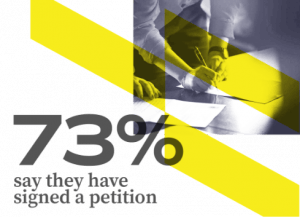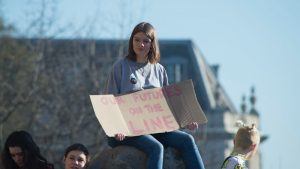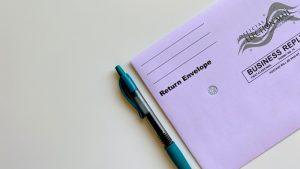The Right to Ask the Government to Fix a Wrong
What is Petition?
The First Amendment is the cornerstone of a government of, by and for the people. One of the five freedoms it guarantees is the right of the people to petition the government for change.
The right to petition protects our right to ask the government to fix a wrong or change a policy. We can petition the federal, state and local governments. Petitions directed to the judicial, executive and legislative branches are all protected.
Petitioning can mobilize popular support to change existing laws in a peaceful manner.
Petition is a powerful tool that has supported social change from the birth of our nation to ending slavery, women’s suffrage and the civil rights movement.
The right to petition does not guarantee a petition will be answered. It does protect the right to complain to the government without fear of punishment.
Historically, a petition was a written request stating a grievance and requesting relief from a ruling authority such as a king. Today signing a petition is one way to exercise this right. But it is not the only way. Petition includes a range of expressive activities designed to influence public officials.
More ways to petition are to:
- File a lawsuit.
- Testify before the government at any level, from your local school board to the U.S. Congress.
- Submit a complaint to a government agency.
- Contact a government official.
- Circulate a ballot initiative or referendum for others to sign.
5 Times World-Class Athletes Used Their Freedom to Petition
The freedom to petition creates a path for all of us to air our grievances — superstar athlete or not.
Read MorePerspective: Why the least known First Amendment freedom could be the most important (and threatened)
Many of the nation’s founders considered petition to be the most important First Amendment freedom.
Read MorePerspective: Protect assembly and petition by preserving listening at public meetings
Two of the least-known First Amendment freedoms are being tested.
Read MoreWe Need to Get a Petition Going to Learn More About ‘Petition’
Far too many of us take our most forgotten freedom for granted.
Read MoreA nation born of petition
Our nation exists because of petition. The British crown had repeatedly ignored the American colonies’ petitions. For many colonists, this was unacceptable. The founders declared independence, saying:
“In every stage of these Oppressions We have Petitioned for Redress in the most humble terms: Our repeated Petitions have been answered only by repeated injury. A Prince, whose character is thus marked by every act which may define a Tyrant, is unfit to be the ruler of a free People.”
Later, the First Amendment specifically protected this freedom that the former colonists did not have.
Voting and petition
Voting is often called the ultimate expression of petition. By voting, citizens can re-elect or remove an incumbent, support a cause or deny a policy proposal.
First Five Now: Ballot Initiatives and the Power of Petition
How petition plays a vital role in getting issues on the ballot.
Read MoreFirst Five Now: Student Activism and the Poll Hero Project
How the Poll Hero Project aims to recruit thousands of young people to be poll workers on Election Day.
Read MoreYou Have a Right to Speak, Assemble, Petition — So Now, Register to Vote
What good are our rights to freely seek change from government if we can’t choose the people in government?
Read MoreLawsuits and petition
The right to petition at least provides the opportunity to institute lawsuits as long as they’re not frivolous. The Brown v. Board of Education school desegregation case was an important milestone in the civil rights movement – and an example of petition.
Lobbying and petition
Lobbyists try to persuade government officials either to support or oppose various policy issues. The right to petition does not grant a lobbyist the absolute right to speak to a government official, nor does it grant a lobbyist the right to a hearing based on their grievances. It does not obligate a government official to act in response. Lobbying does not get greater protection than any other expression protected by the First Amendment.
 ‘Where America Stands’ survey on petition
‘Where America Stands’ survey on petition
Americans use their right to petition more than they might realize. The latest Freedom Forum survey shows just 14% can name it as a First Amendment freedom. But 73% say they have signed a petition and more than four in 10 have petitioned elected officials in other ways.
Petitioning that made a difference
A young girl’s petition to the president
Mari Copeny was tired of not being able to take a bath, so the 8-year-old wrote a letter to President Barack Obama in 2016 asking him to fix Flint’s lead-contaminated water supply. She was voicing the complaints of many citizens. He visited her in Flint, Mich., and gave federal funds to help.
Petitions help women win the vote
Watch how suffragists made creative use of the right to petition to seek the right to vote for women in a virtual tour of the “First Amendment Freedoms: Women Win the Vote” exhibit.
Support for this exhibit was provided by Booz Allen Hamilton and the Barbara Lee Family Foundation.
The freedom of petition is featured at the 3:00 mark.
Gen Z Petitions
2020 Al Neuharth Free Spirit Scholar Bridgette Adu-Wadier interviewed student journalists and activists from around the country when she was a senior at T.C. Williams High School in Alexandria, Va. She asked them to share ways in which they exercise their First Amendment freedoms, with particular focus on the freedoms of petition and the press, and their impacts on elections.
Resources for the freedom to petition
Explore the Freedom Forum’s artifacts, lesson plans and educational resources about the freedom of petition. Sign up for a free education account to get access to copyright-protected material only available to registered users.







